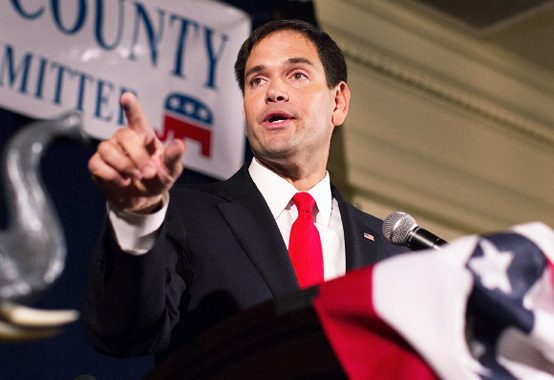Rubio’s Candidacy Still Makes No Sense

Jonathan Bernstein gets a bit carried away:
Why won’t Tea Partyers and other conservatives destroy his candidacy based on his former position on immigration? For the answer, go back to Mitt Romney’s experience in 2012, when many thought he had no chance of getting the Republican nomination because of his approval of a Massachusetts health-care law that was compared to Obamacare.
Many people did mistakenly dismiss Romney’s candidacy for this reason, and I said they were wrong at the time. One reason why the Massachusetts health care legislation didn’t drag Romney down was that he made it clear that he wanted to repeal the ACA. When it came to the relevant federal legislation, Romney lined up with the rest of the party, and Romney’s record wasn’t held against him by most conservative opponents of the ACA. Rubio is in a very different position, since he not only supported the Senate immigration bill, but was initially one of its leading advocates on the Republican side. Put simply, Rubio clearly sided with Obama in a prominent national debate, and Romney didn’t. Doing that hurt Rubio with conservatives at least as much as the content of the bill, and perhaps more so.
It is worth remembering Romney’s example as evidence that presumptive front-runners can and do get away with dissatisfying “very conservative” primary voters. It doesn’t tell us very much about what long-shot, first-time candidates can get away with in a very crowded field. Rubio isn’t in Romney’s 2011-2012 position. If we want to compare him to earlier Republican candidates, he is more like McCain in 2000 or Romney in 2008. Both of them had a record of positions that put them at odds with movement conservatives, and both of them were running for president for the first time. McCain took pride in this and ran against Bush from the “left,” and Romney underwent one of his periodic transmogrifications in order to pretend that he now agreed with movement conservatives on almost everything. Most conservative voters didn’t trust either of them, and neither of them won the nomination that year. Rubio’s clash with conservatives on immigration is very recent, and if anything it has been made worse by the fact that he has tried to imitate both McCain and Romney in a short span of time.
When he was absurdly being touted as a “savior” of the party, he played at being like McCain and backed the Senate immigration bill, which angered many conservatives in the process and caused some of his previous supporters to feel that he had let them down. Alarmed by the backlash, he then ran away from the bill and started going out of his way to placate his conservative critics in a most Romney-like fashion. This has mostly earned him a loss of respect from both sides of the debate. As far as his conservative critics are concerned, he showed his true colors in supporting the bill, and in the eyes of “reform” supporters he caved immediately when he encountered the slightest resistance. In the end, the one big legislative effort Rubio was involved in produced no results, and he suffered political whiplash in the process.
The entire episode left Rubio looking foolish, which is never desirable. It also discredited the main argument for a Rubio presidential candidacy, which is that he is supposedly a “transformational” candidate capable of expanding the Republican coalition. There is no evidence that Rubio can do this, and the argument was based almost entirely on Rubio’s support for immigration “reform” and on his ethnic background. Once he was burned on immigration and retreated from his earlier position, any chance he had of playing the role his boosters imagined for him disappeared. The bigger problem is that a Rubio candidacy ceased to have any rationale at that point (not that it had much of one before then), but he is still proceeding as if he is still perceived as the party’s “savior.”
Because he is now running for the first time, he does not yet have the reservoir of past support that he can draw on as McCain did in 2008 and Romney did in 2012. He is running against a number of candidates that are at least as conservative as he is, and Bush is taking up the role of the relative moderate in the race, and that leaves him without an opening. He will probably poach a few Bush supporters along the way, but there is not enough room for another candidate with a profile almost identical to Bush’s. Maybe things would different if Bush weren’t in the race and Rubio had something other than hard-line foreign policy views to run on, but under the circumstances Rubio’s decision to run makes no sense. Indeed, a Rubio candidacy stopped making sense once his immigration gambit blew up in his face.
Comments